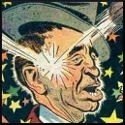|
That just usually means that the person who has to make the arcana check is.. not the person casting counter spell? So probably not the wizard, so probably not someone with high int/arcana. Just a bizarre system imo. I'd let them identify it as a free action if you really want the spell to be a mystery. Maybe give them a hint if they just barely fail instead of going "nah gently caress you"
|
|
|
|

|
| # ? Apr 29, 2024 06:31 |
|
Miftan posted:That just usually means that the person who has to make the arcana check is.. not the person casting counter spell? So probably not the wizard, so probably not someone with high int/arcana. Just a bizarre system imo. I'd let them identify it as a free action if you really want the spell to be a mystery. Maybe give them a hint if they just barely fail instead of going "nah gently caress you" If you want perfect information yes. Otherwise you take a risk with your resources. It's always an int check so anyone with a decent arcana can do it, and charisma or wisdom casters can have CS but not have Arcana prof. Dexo fucked around with this message at 15:32 on Jan 19, 2024 |
|
|
|
Good Lord, stuff like this is why I don't play wizards. I just wanna hit a monster with a sword, not try and puzzle out the unintuitive interactions of D&D's rules with spells that explicitly subvert them in poorly designed ways. This is nobody's class fantasy, nobody ever read an adventure story about a magician arguing with the author about his spell's EULA
|
|
|
|
|
Asterite34 posted:Good Lord, stuff like this is why I don't play wizards. I just wanna hit a monster with a sword, not try and puzzle out the unintuitive interactions of D&D's rules with spells that explicitly subvert them in poorly designed ways. This is nobody's class fantasy, nobody ever read an adventure story about a magician arguing with the author about his spell's EULA I should introduce you to a few rabbis..
|
|
|
|
spells can be identified by anyone with high int, which--hang on, I'm seeing here INT is a dump stat for everyone in the PHB except wizards and two subclasses? e: also it is actually kind of an enormous issue that were it not for this singular spell you would in fact almost always just say "the evil wizard casts fireball, give me a dex check" instead of "the evil wizard casts a spell" and passing priority. Is there anything else where the timing of knowing the specific spell cast matters that much? Every other time I can think of where priority matters, the only thing you need to conceal is if a roll succeeded or failed (so people have a chance to declare intent to force a reroll via lucky or barbs or divination wizardry etc). Counterspell creates a singular and uniquely frustrating priority bottleneck across the entire game for one spell. That's bad flow! This is what I mean by it lacking rigor compared to MTG. Magic has clear and specific points at which priority passes from one person to another. D&D counterspell doesn't even properly peg the trigger for casting counterspell to an existing in-game act, because for no other reason would you say "the wizard begins casting a spell". Valentin fucked around with this message at 17:41 on Jan 19, 2024 |
|
|
|
Splicer posted:Part of... I think Unknown Armies? lore is that James Randi is (was
|
|
|
|
Valentin posted:spells can be identified by anyone with high int, which--hang on, I'm seeing here INT is a dump stat for everyone in the PHB except wizards and two subclasses? I'm starting to think that these Wizards of the Coast guys are bad at game design!
|
|
|
|
Dexo posted:An example also that's a bad example you provided with the player interrupting. If counterspell is balanced around players not knowing what spell is being cast, as you earlier claimed, you can't name a target and use "give me a [blank] save" as the point to pass priority. that's already information about the spell being cast. to do this as you are suggesting the dm would have had to say "fargoth begins casting a spell" and wait a beat before launching into any description or anything that could signal what the spell is. save or suck spells, especially ones that are single target, are by far the most important things to counterspell 99% of the time! even in this hypothetical where you controlled every aspect, there's this minor procedural issue in the resolution, because the rule is so pointless and violates so many other principles of good play (like keeping combat moving) that you are constantly going to have people run up against it and you naturally wrote the error in. because it is badly designed. e: this is also why every single rule that says "after a roll is made but before success or failure is declared" is absolute trash and should be thrown out. Time wasting bullshit that exists to cause fights and slow down games all to preserve a sense of uncertainty and a chance of failure, which is something you can bake into the game in a million different ways that don't slow it down. Silvery barbs became a problem not because it is poorly designed and overpowered as an effect, but because it is well designed (it is simple, has a clear trigger, and a reliable effect, making players want to use it. you shouldn't be able to target yourself for advantage would be my main change) and simply undercosted. Valentin fucked around with this message at 18:23 on Jan 19, 2024 |
|
|
|
Valentin posted:also that's a bad example you provided with the player interrupting. If counterspell is balanced around players not knowing what spell is being cast, as you earlier claimed, you can't name a target and use "give me a [blank] save" as the point to pass priority. that's already information about the spell being cast. to do this as you are suggesting the dm would have had to say "fargoth begins casting a spell" and wait a beat before launching into any description or anything that could signal what the spell is. save or suck spells, especially ones that are single target, are by far the most important things to counterspell 99% of the time! Sorry I said previously that I do give players some information. Dexo posted:Yeah, counterspell is balanced around the players not knowing what is being cast. But yes RAW you just say x is casting a spell, and the same process happens. Everyone has different levels of houseruling they do in every system to streamline things, also I technically think since it's in Xanathar's it's a "variant" rule anyway lol. I think the other options people do are fine, and don't think people are "wrong" to not like the more fiddly parts. This wasn't a controlled hypothetical either. This legitimately happened in a game that I was GMing like a year and a half ago lol. Character names were not changed to protect the guilty. Int is a dump stat for most classes, but you don't need int to be proficient in Arcana. We had no Wizards or Artificers in that party. That was a Rogue with Arcana with a +0(maybe +1 I don't remember?) in int, and a bard who had CS. This is not me intending to defend 5e. I don't think 5e is particularly well written. I haven't run 5e since that campaign ended and have only just been keeping up with the changes in this new edition. But my main point is I don't think it's THAT much more time consuming. People were acting as if it's some long drawn out process when like once you figure out how you want to handle these things, and it's known by players how these things resolve without having to go to rules lawyer court every time things can get pretty snappy.
|
|
|
|
Dexo posted:People were acting as if it's some long drawn out process when like once you figure out how you want to handle these things, and it's known by players how these things resolve without having to go to rules lawyer court every time things can get pretty snappy. that's just every game, though. it goes without saying. there are people who play the fiddliest wargames smoothly and easily because they and their playgroup know where all the frustrating or time-consuming bits are and know how they agree on how to work around them. the point of discussing rules and design is to talk about RAW and RAW implementations. if it's only a long drawn-out process until you and your players know each other and your gameplay rhythms and which parts you want to streamline by silent agreement...then it's a long drawn-out process. Valentin fucked around with this message at 19:05 on Jan 19, 2024 |
|
|
|
Valentin posted:that's just every game, though. it goes without saying. there are people who play the fiddliest wargames smoothly and easily because they and their playgroup know where all the frustrating or time-consuming bits are and know how they agree on how to work around them. the point of discussing rules and design is to talk about RAW and RAW implementations. if it's only a long drawn-out process until you and your players know each other and your gameplay rhythms and which parts you want to streamline by silent agreement...then it's a long drawn-out process. It's not a long drawn out process in a session 0 to say, hey this is how I generally handle this stuff. Anyone have any questions or concerns. But Largely it's fine if you think it's bad design, I don't think it's particularly bad, as in I get the reason they did it that way and it makes sense. It's just fiddly. Just like I some of the stuff in PF2E a system I generally love is a bit too fiddly. Dexo fucked around with this message at 19:09 on Jan 19, 2024 |
|
|
|
I think what bothers me about that as an implementation is that it requires a non-wizard character to identify a spell and then shout that information to the wizard. It makes sense tactically and as a way to handle and I don't begrudge you that at your own table, like that's fine, but this is a discussion thread for a new playtest and it makes sense to discuss the merits and flaws of design objectively rather than its worthiness at one table. The main problem is that the same resource you use to identify a spell (a reaction) is the same resource you use to counter the spell (a reaction), and so to perform this series of actions you need two characters with unspent reactions, one of whom is a 'wizard' (wizard being standin for 'anybody with a counterspell', in this scenario) and the other who is a non-wizard, presumably with Int as a high stat. So there are a couple of issues with that. The first is your Wizard is forcd to give up some of their area of focus - presumably, Arcana - to a secondary character, which is mostly an issue of ego and probably best negotiated at the table, but can make for pretty awkward roleplay scenarios. The second issue is more serious, which is that you need two characters to line up in initiative order and both of them need to spend a resource to make it work. Now, I think what is going to happen in reality, is that the wizard is just going to make his choice without the information of what spell he is encountering like, 90% of the time. That's actually fine, and in fact, if that was the route you were going to go down I would probably just make that the rule, that you just don't have time to figure out what spell someone is casting to eliminate the edge case of these two characters lining up with unspent reactions who both have Int investment. You can even design around that, ruling that passive arcana - which for most characters is going to be like 17 or 18 by mid levels - allows you to recognize some spells but not all (and conveniently the 15+spell level DC rule lets wizards automatically identify spells in the level 0 to 3 range which sort of makes sense, they're the most common spells). You can introduce items or spells that increase this range. In other words if the goal is to remove perfect information from the counterspell calculus I'd probably just do away with the kludge of allowing a very round-about way of getting that information back, and just let it be mysterious. Identifying spells as they are being cast is a vestigial remainder from prior editions anyway.
|
|
|
|
That's very fair. I think the passive arcana rule is probably the most elegant way of handling it. Unless you just remove Counterspell as a spell, which I know a bunch of 5e GM's also houserule. Because I generally tend to think if something like counterspell is going to exist, it has to come with some notion of risk, or restrictions, or cost of reactions/resources of not having perfect information, and knowing like what level spell slot you have to burn to do something without ever potentially using maybe a spell slot lower than the spell slot needed to counter a spell. Because man one reaction to kill an entire action without a roll(if you know the level of the spell) is very very very powerful to me. It's why I get why people don't gently caress with Silvery Barbs, and to me that is less powerful than CS(albeit lower spell slot for SB).
|
|
|
|
In my personal experience, nothing gets the table hooting and hollering louder than interrupting the DM on his own turn to change the flow of combat. I can understand tinkering around the edges of Counterspell/Silvery Barbs etc. but removing them entirely is gonna make for a worse game than having them be slightly OP
|
|
|
|
"Slightly" doing a lot of work there.
|
|
|
|
|
Would you need a whole separate Intellgence/Wisdom or Wisdom/Insight check to counter divine spells? After all, those are about identifying the petitioning the higher powers for an effect, not perfectly replicating a specific ritual. Also why not allow for something like Insight as the skill to be used for arcane spells? Maybe you don't need to know the specific spell, just enough battlefield knowledge to know what the caster is likely to try and accomplish with a spell.
|
|
|
|
theironjef posted:Would you need a whole separate Intellgence/Wisdom or Wisdom/Insight check to counter divine spells? After all, those are about identifying the petitioning the higher powers for an effect, not perfectly replicating a specific ritual. Also why not allow for something like Insight as the skill to be used for arcane spells? Maybe you don't need to know the specific spell, just enough battlefield knowledge to know what the caster is likely to try and accomplish with a spell. In that case, I'd only allow insight to identify what the general effect and power of a spell might be. Like, if a wizard looks like they're really putting their all into it, and they got an eye to blast someone, or to make an illusion. You can't insight your way to knowing the names of spells you haven't heard of. Knowing the names of spells in Forgotten Realms is like knowing specific, obscure tax laws in specific detail in ours. Only trained specialists have that kind of info.
|
|
|
|
Mr. Lobe posted:In that case, I'd only allow insight to identify what the general effect and power of a spell might be. Like, if a wizard looks like they're really putting their all into it, and they got an eye to blast someone, or to make an illusion. You can't insight your way to knowing the names of spells you haven't heard of. Knowing the names of spells in Forgotten Realms is like knowing specific, obscure tax laws in specific detail in ours. Only trained specialists have that kind of info.
|
|
|
Dexo posted:Because man one reaction to kill an entire action without a roll(if you know the level of the spell) is very very very powerful to me. It's why I get why people don't gently caress with Silvery Barbs, and to me that is less powerful than CS(albeit lower spell slot for SB). The cost of Counterspell is that you're using a Level 3 Spell Slot (or higher, to guarantee success against higher level spells) and a reaction to deny the effect. Yes, it's powerful, but so are a lot of Level 3 spells. All of these arguments feel predicated on players countering Literally Everything, but burning your spell slots on Counterspell burns you out fast. As someone else pointed out, character spell slots are invariably more valuable than monster spell slots, and you are trading one for the other. People have also pointed out that reaction economy is really, really tight, and I agree with that. Now, obviously there are still some pain points (Warlocks with Counterspell, what to do if everyone on the team somehow has access to Counterspell), but I think the idea that Counterspell is OMG Busted without imperfect information is one of those things I just can't agree with.
|
|
|
|
|
I feel like your first houserule here isn't even about counter spells, it's about defining basic knowledge of magic as equivalent to knowing obscure tax law. That'd make more sense as an analogy if there was a class of real world people that routinely had to venture into office buildings and get into mortal fights with wizened and powerful CPAs. That stuff with wizards being hyper rare and their every move an extra special secret feels like it sort of fell out of favor between 2 and 3e. Btw the natural glib response here is likely "yeah that's IRS auditors" or something. But that would of course fall apart because then the analogy is that you're playing as the fantasy equivalent of these auditors and they would have that specialized knowledge. theironjef fucked around with this message at 23:39 on Jan 19, 2024 |
|
|
|
counter spell isn't as cool as silence which is the same thing but you gotta wiggle your character out of the bubble
|
|
|
theironjef posted:I feel like your first houserule here isn't even about counter spells, it's about defining basic knowledge of magic as equivalent to knowing obscure tax law. That'd make more sense as an analogy if there was a class of real world people that routinely had to venture into office buildings and get into mortal fights with wizened and powerful CPAs. That stuff with wizards being hyper rare and their every move an extra special secret feels like it sort of fell out of favor between 2 and 3e. Even the ones explicitly not proficient in arcana? e: Also a bit weird to call that a house rule given Xanathar's rules on identifying spells
|
|
|
|
|
Ominous Jazz posted:counter spell isn't as cool as silence which is the same thing but you gotta wiggle your character out of the bubble until you as a DM set up an encounter forgetting that Silence isn't "no casting" and is just "Nothing with Verbal components". and then your entire final room encounter you intended to have a clever solution to get rid of the silence doesn't matter as the Bard casts Hypnotic Pattern and they murder everyone ignoring the lair conditions lol. Oops
|
|
|
|
Staltran posted:Even the ones explicitly not proficient in arcana? e: Also a bit weird to call that a house rule given Xanathar's rules on identifying spells Yeah, that's certainly fair, though admittedly I haven't read Xanathar's. I more meant all the discussion about how many reactions and steps it takes to counter a spell at some folks' tables. For a second I thought Xanathar's had a section on how rare and inscrutable wizards are supposed to be. Dexo posted:until you as a DM set up an encounter forgetting that Silence isn't "no casting" and is just "Nothing with Verbal components". Honestly this is the seed of a neat fix. If Silence only stops spells with Verbal components, how neat would it be to say "yeah, that's the Cleric role in spell defense. Meanwhile Bards get "Fumblefingers" which blocks spells that have Material components, and Wizards get "Arctic Wind" which causes enemies to shiver so much they can't cast spells with Somatic components. Warlocks get Eldritch Blast." theironjef fucked around with this message at 01:37 on Jan 20, 2024 |
|
|
|
I would also say the perception that Counterspell is 'op' kind of comes down to encounter design and how hosed it is too. Consider that classic moment of DM frustration: evil vizier prepares his big hello, a fireball that is meant to cut the party's HP quickly and effectively to make the minions in the back row a credible threat. The DM has prepared for this moment. Then the party counterspells him and proceed to give him a proper smackdown without ever breaking a sweat. Even the best DM can occasionally get frustrated by having their archenemy's best tricks immediately turned off by the party. But I would also say this shines a light on a very nasty vulnerability in encounter design for DMs. For one, many DMs, despite constantly being warned otherwise, make the mistake having solo bosses without any tricks, houserules, or innovations to compensate for the action economy disparity this creates. Solo encounters (or elite encounters) need bosses with multiple phases, access to limited sources of additional actions, ways to shrug off status effects, and so forth. Legendary Monsters are a start, but they're pretty weak, amounting to a single off-turn cantrip or melee attack in some cases. Bosses have HP equivalent to a slightly beefier version of a monster of their level, which is also a mistake, if you plan on running through their whole bag of tricks. If your boss can take a turn, then a player goes, and then they take another turn, a single counterspell doesn't sound as bad anymore. And in non-critical encounters, the player's loss of a spell slot is probably a bigger loss than the enemy's loss of an action, over the whole adventuring day. Which leads to my second consideration: enemies should break the rules. Occasionally a boss can cast two spells per turn, or have a second NPC who counterspells the players' counterspell or use abilities that don't count as spells. A DM armed with good guidelines can do this sparingly or in a way that is still fair to the PCs, but is surprising and strange to the players. Basically a single counterspell to the jewels only feels OP because entire encounters hinge on the ability of a specific enemy to cast one or two spells, and because of the symmetry between the NPCs and the PCs. And that's probably not a great way to design an encounter.
|
|
|
|
I think the other part of that is that at least as the game is balanced, you also want to make sure there are several encounters before the big boss to drain away character resources. I think that’s where the adventuring day thing gets muddy—notionally, the party can handle 6-8 medium to hard encounters per day, and fewer if the encounters are deadly, but in my experience a full day of medium encounters will tend to burn through spellcaster slots, while a smaller number of deadly encounters tend to burn through martial HP before the spellcasters run out of juice. I don’t have any math to back that up, to be clear, just my gut feeling. Objectively true or not, I tend to find that as long as the party are running relatively low on spell slots, counterspell is a really hard choice even with perfect info. My wizard villains have a tendency to try to bait counterspell early, waiting to see if the players will counterspell stuff before dipping in for the hard stuff. Any wizard that can cast 5th-level spells or better is going to start out pelting fireballs at the group for that exact purpose. Leaving the player with the desperate worry—if I counterspell this, what else does he have in the tank?
|
|
|
|
Asterite34 posted:Good Lord, stuff like this is why I don't play wizards. I just wanna hit a monster with a sword, not try and puzzle out the unintuitive interactions of D&D's rules with spells that explicitly subvert them in poorly designed ways. This is nobody's class fantasy, nobody ever read an adventure story about a magician arguing with the author about his spell's EULA lol this is literally the ending of Harry Potter
|
|
|
Ghost Leviathan posted:lol this is literally the ending of Harry Potter True, and everyone hated that bit!
|
|
|
|
Mendrian posted:I would also say the perception that Counterspell is 'op' kind of comes down to encounter design and how hosed it is too. This is also incredibly true: Counterspell feels more powerful and without restrictions if an encounter's design hinges on a single powerful enemy throwing out big attacks, it makes the action economy disparity even worse if you have a sole Big Enemy who needs to have Big Actions and a caster can just invalidate that action.
|
|
|
|
Monathin posted:This is also incredibly true: Counterspell feels more powerful and without restrictions if an encounter's design hinges on a single powerful enemy throwing out big attacks, it makes the action economy disparity even worse if you have a sole Big Enemy who needs to have Big Actions and a caster can just invalidate that action. Counterspell counters...spells. It doesn't work on a dragon's breath attack, of course; but it doesn't work on a Firewizard Ubermage's Explodyball either, even if that is an action on its statblock that has the exact same effect as fireball. A lot of monster design has moved away from having monsters with a Spellcasting trait and a list of 15 spells in favour of more readable/actionable ones that have "spell-like" actions to be used over the three average rounds of combat. But since this was not the case when they first wrote 5e, they didn't feel like there was any need to define "supernatural/magical but not spell" abilities in any way. So we are lacking somewhat specialized roles in countering magical effects and the vast majority of those are not counterable at all unless they fall under some vestigial systems like a bard's Countercharme. In the entirety of a 1-11 Tomb of Annihilation campaign my players have maybe casted 3 counterspells, and the third did not work because Acererak had a Globe of Invulnerability on. On the other hand, Counterspell is incredibly effective at shutting down enemy Spellcasters (and nothing else) to the point of being busted in that case. But now you also have to have a non-wizard character roll a below average skill check to tell the wizard what to counter as a balancing mechanism. It's like...a cascade of questionable decisions trickling one into another over the years, causing an absolute mess of design and fluff for an ability that is rarely usable, but is at the same time clunky and too strong when it does. That Italian Guy fucked around with this message at 10:35 on Jan 20, 2024 |
|
|
|
|
I simply have Enrique, my staggeringly buff and intelligent valet with the alert feat, delay their turn to coinccide with the enemy caster’s, and they explain to me with a free speaking action what they’re casting and how they’re doing it.
|
|
|
|
The problem with counterspell is it's a wizard's duel to see how much nothing happens. If you fail then nothing happens from your attempt and if you succeed double nothing happens. Counterspell should be an ability that alters, not turns off, a spell, selected from a list of defined options. Redirect a single target spell to the tank (with permission) or a reduced hit to yourself. Force an adjacent enemy to also suffer the effects. Give everyone resistance to the damage type. Push the caster's initiative to after the next PC. Exclude a target from an AoE attack. Spending equal to or higher than the casting slot gets you advantage - no messing about with arcana checks, you just say you're overcasting or you're not. This can replace the spell level gamble if you like that sort of thing - if the GM doesn't have to tell you what level you're countering then you could end up spending a higher level spell than you expected, and if you don't actually have a spell slot that high then you expend the highest one you can and still get the positive effects but you lose a hit die or something. You could also gate certain effects behind spell level - you can't make a guy finger of death himself without matching. Leverage advantage. Rolled two successes on your upcast? The bad guy's attempted snipe on the 2hp rogue just pinged off the Paladin AND ricocheted into his minion's face. Crit on a low cast? Pick two base results or one upcast effect. Now you have a Wizard Duel. Spell flying everywhere, big beams of energy pushing against each other as their respective HP drops lower and lower, the evil wizard sacrificing minions for safety while the heroes support each other why the power of friendship... And if your crit on an upcast? You got the holy grail. Shut it all down. Get Counterspelled, idiot. ------ Of course ideally this version of Counterspell would be the hyped up wizard duel version of a universal mechanic. Anyone can spend their reaction to attempt to redirect magical, divine, or bog standard physical attacks from an adjacent ally to themselves by just jumping in the way. Martials can spend martial dice to redirect at range/reduce damage/include enemies etc. But baby steps. Splicer fucked around with this message at 12:34 on Jan 20, 2024 |
|
|
|
Monathin posted:This is also incredibly true: Counterspell feels more powerful and without restrictions if an encounter's design hinges on a single powerful enemy throwing out big attacks, it makes the action economy disparity even worse if you have a sole Big Enemy who needs to have Big Actions and a caster can just invalidate that action. This is what Legendary Actions are for. I know that some GM's give Big Boss monsters the ability to spend two legendary actions to cast a spell, and wizards only have one reaction a turn. GM's can also attack the wizard to try and get them to burn their reaction on Shield - which is particularly effective if the Wizard has a concentration spell they really want to keep active.
|
|
|
Stabbey_the_Clown posted:This is what Legendary Actions are for. I know that some GM's give Big Boss monsters the ability to spend two legendary actions to cast a spell, and wizards only have one reaction a turn. GM's can also attack the wizard to try and get them to burn their reaction on Shield - which is particularly effective if the Wizard has a concentration spell they really want to keep active. What if there are two wizards, though?
|
|
|
|
|
Staltran posted:What if there are two wizards, though? We had two wizards in our campaign. BBG casts Fireball. Wizard 1 casts Counterspell. BBG then casts Counterspell on the Counterspell. Wizard 2 then casts Counterspell on the Counterspell of the Counterspell. All succeeded, the Fireball spell failed.
|
|
|
|
The funny thing about the supposedly RAW team counterspell is that, like, there's still a single basically static block of time between when the enemy starts waving their hands and chanting and when they actually complete their spell, right? And the bard, let's say, can't even start incanting their own counterspell before the party wizard has made an Arcana check to confirm what the enemy is casting and then shout what they've learned to the bard. But the bard simply can't do anything in that span of time themselves? I understand that the implicit narrative created by the fact that you only get one Reaction-type action is that the mental math or whatever that the bard would've required to identify what's coming themselves would presumably have been so time-consuming or exhausting that they simply wouldn't have the spoons to immediately follow it with a counterspell, while if they just stood there anxiously hanging on their party member's words they would, but it looks and sounds very silly in practice. Ferrinus fucked around with this message at 18:40 on Jan 20, 2024 |
|
|
|
Reveilled posted:I think the other part of that is that at least as the game is balanced, you also want to make sure there are several encounters before the big boss to drain away character resources. I think that’s where the adventuring day thing gets muddy—notionally, the party can handle 6-8 medium to hard encounters per day, and fewer if the encounters are deadly, but in my experience a full day of medium encounters will tend to burn through spellcaster slots, while a smaller number of deadly encounters tend to burn through martial HP before the spellcasters run out of juice. I don’t have any math to back that up, to be clear, just my gut feeling. Objectively true or not, I tend to find that as long as the party are running relatively low on spell slots, counterspell is a really hard choice even with perfect info. My wizard villains have a tendency to try to bait counterspell early, waiting to see if the players will counterspell stuff before dipping in for the hard stuff. Any wizard that can cast 5th-level spells or better is going to start out pelting fireballs at the group for that exact purpose. Leaving the player with the desperate worry—if I counterspell this, what else does he have in the tank? In my experience, adventuring day attrition goes in two directions: either the encounters are too frequent/too deadly and the casters are essentially out of slots by the time they reach the climax, or casters can safely conserve and stick to cantrips and maybe one other spell per encounter. Bonus “points” if you solve repeated attritive encounters by casting Spirit Guardians and just running around dodging as enemies blow up. There’s two big problems with Counterspell and neither is figuring out how to handle an arcana check. The first is that it feeds into D&Ds big weakness, which has been only partly fixed and which has already been discussed: you take an action and if you fail, you accomplish nothing. 5E still does that (4E at least had some cool powers, usually dailies, that did something on a miss), but has mostly eliminated double and triple-jeopardy situations. An example in 3E: roll concentration to cast a spell defensively: if you fail, you accomplish nothing with that action, and if you succeed, you roll to hit or trigger a saving throw to see if you accomplish something. Counterspell creates a double-jeopardy situation where your spell could fizzle before you get to roll to see if it fizzles. But the second and, IMO, bigger problem is the distortive effect it has on all encounters and encounter designs. Because it hits the action economy twice: not only did I make you do nothing for your action, I also cost you a limited resource. It’s worse when used against PCs except as a rare device where players know it’s coming: attacking the abjurers’ guild and going in knowing they’ll have multiple Counterspell experts allows the PCs to figure out ways around that (staying 80 feet back, subtle spell, casting Telekinesis before going in, etc), so that would be fun. Otherwise, you force PC casters to assume all enemies with a certain profile can cast Counterspell and they need a permanent defense. But odds are most encounters won’t have foes with Counterspell, so while that’s not much fun at the table, it’s not distortive like PC Counterspell. Because a PC with Counterspell will always have it ready, meaning any encounter with monster/NPC casters has to take the PC Counterspell into effect. Either you don’t plan around it and end up with enemy casters getting shut down, or you do what 5E started to and give monster casters consistent damaging attacks immune to Counterspell, or you start equipping foes with Counterspell defensively. But every encounter with a caster, you need to know Counterspell is an option and have some way to deal with it. You don’t have to redesign encounters around sneak attack, or specific Battlemaster maneuvers, or even a spell like Spirit Guardians. And you’ll have plenty of encounters where it won’t matter because no foes have spells. But if you’re rewriting encounters (or worse, monster stats) based on how a single L3 spell will affect them, that spell’s distorting gameplay.
|
|
|
|
To me anyway, the notion of the person casting a spell being able to counter spell a counter spell while still continuing to cast the original is also pretty silly looking narratively. Also re inferior arcana checks, lol pretty sure a rogue with expertise in arcana equals or even outpaces a Wizard around the mid levels when it comes to arcana checks. Especially if they do put even a 12 or God forbid a 14 in int. God I love 5e.
|
|
|
|
You know what would have been great? A character that had some sort of battlefield awareness skill and used reactions a lot as part of their design to help shape combat in favor of the rest of the party. Probably have some special ability to react to casters by calling out to party members for appropriate responses. Some sort of lord of war, I dunno.
|
|
|
|

|
| # ? Apr 29, 2024 06:31 |
|
theironjef posted:You know what would have been great? A character that had some sort of battlefield awareness skill and used reactions a lot as part of their design to help shape combat in favor of the rest of the party. Probably have some special ability to react to casters by calling out to party members for appropriate responses. Some sort of lord of war, I dunno. Sounds like some World of Warcraft poo poo
|
|
|












 ) a powerful reality sink but completely unaware of it.
) a powerful reality sink but completely unaware of it.





















